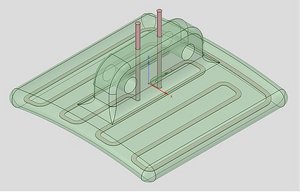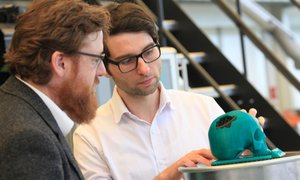In modern, patient-oriented medicine, intelligent products made of polymer materials play an increasingly important role. In addition to the applicability in clinical use, the individualization of materials and the personalization of the products made of polymers also become the focus of research and development.
The Chair for Polymer Processing deals with the development and processing of high-performance polymer materials for medical use in conventional and additive processes as well as the creation of medical models made of polymers.
The project CAMed has two subtasks, with their main concerns lying within different material categories. On the one hand the metallic additive production will be done mostly with powder bed fusion. On the other hand are the polymers: The Institute for Polymer Processing is responsible for the additive Material Extrusion of polymeric materials, where among others metallic implants should be substituted with polymers, which have less weight, defined stiffness and also the possibility that X-rays can pass through.
With the use of tailor-made polymers and different additive technologies for polymeric materials, better suited personalized implants should be produced directly in the clinics, to save time and costs. Due to less operations and shorter operation times, the well-being of the patience should increase in the clinic and after the implantation
CAMed is funded by the Austrian Research Promotion Agency FFG within the framework of the COMET, K-Projects, 7th Call for Proposals COMET Projects 2017.
Project partners: Medizinische Universität Graz Facheinheit für Experimentelle Neurotraumatologie, HAGE Sondermaschinenbau GmbH, Montanuniversität Leoben Lehrstuhl für Kunststoffverarbeitung, Quadrant EPP USA, Inc., Heraeus Deutschland GmbH & Co. KG, ARBURG GmbH + Co KG, JOANNEUM RESEARCH Forschungsgesellschaft mbH, LSS Laser-Sinter-Service GmbH, Technische Universität Graz Institute for Computer Graphics and Vision, Lithoz GmbH, Hofer GmbH & Co KG, FARO Europe GmbH & Co. KGTechnische Universität Graz Institut für Maschinenbau und Betriebsinformatik, Montanuniversität Leoben Lehrstuhl für Werkstoffkunde und Prüfung der Kunststoffe, CAE Simulation & Solutions Maschinenbau Ingenieurdienstleistungen GmbH, Ionbond Austria GmbH, voestalpine BÖHLER Edelstahl GmbH & Co KG
Further information in the biennial report 2017 - 2018 (S. 30)

CerAMfacturing
In the project CerAMfacturing, financed by the European Union, personalized medical products are developed.
Traditional production methods, such as injection molding, are economically not viable for the production of individualized parts. Therefore the additive manufacturing technologies could be used. As one of the case studies, a customized infrared limb heater for neck and shoulders will be produced. Its outer side should be an electrically insulating ceramic and the inside core should be a conductive metal.
This project has received funding from the European Union’s Horizon 2020 Research and Innovation Programme.
Partner: Fraunhofer-Institut für keramische Technologien und Systeme, Admatec, Ceramicx Ireland Ltd, et al.
Further information in the biennial report 2015 - 2016 (page 42)

iPrint
Printed cranial implants made of polymers, produced directly in the operating room during surgery. This is the goal of the FFG Bridge project "iPrint".
Patient-specific, cost-effective solutions are becoming increasingly important in medical technology. Additive manufacturing processes ("3D printing") can contribute through their flexibility and material-efficient operation. iPrint will produce a 3D clinical imaging system that can quickly and intra-operatively provide the cranial area with customized materials and design, resulting in faster healing, better aesthetic results, less pain for patients, and lower cost the health system.
The project has a strong interdisciplinary orientation, the machine construction aspect is supervised by the Obdach company Hage Sondermaschinenbau, the medical side through the Meduni Graz and the material side by the Department of Polymer Engineering Leoben. The aim of this project is to expand the work area "Additive Manufacturing Processes in Medical Technology" with the focus on material development at the Chair for Polymer Processing.